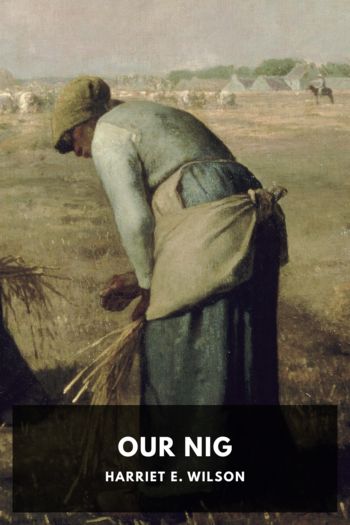Our Nig Harriet E. Wilson (best pdf reader for ebooks .txt) 📖

- Author: Harriet E. Wilson
Book online «Our Nig Harriet E. Wilson (best pdf reader for ebooks .txt) 📖». Author Harriet E. Wilson
The horrors of her condition nearly prostrated her, and she was again thrown upon the public for sustenance. Then followed the birth of her child. The long absent Samuel unexpectedly returned, and rescued her from charity. Recovering from her expected illness, she once more commenced toil for herself and child, in a room obtained of a poor woman, but with better fortune. One so well known would not be wholly neglected. Kind friends watched her when Samuel was from home, prevented her from suffering, and when the cold weather pinched the warmly clad, a kind friend took them in, and thus preserved them. At last Samuel’s business became very engrossing, and after long desertion, news reached his family that he had become a victim of yellow fever, in New Orleans.
So much toil as was necessary to sustain Frado, was more than she could endure. As soon as her babe could be nourished without his mother, she left him in charge of a Mrs. Capon, and procured an agency, hoping to recruit her health, and gain an easier livelihood for herself and child. This afforded her better maintenance than she had yet found. She passed into the various towns of the State she lived in, then into Massachusetts. Strange were some of her adventures. Watched by kidnappers, maltreated by professed abolitionists, who didn’t want slaves at the South, nor niggers in their own houses, North. Faugh! to lodge one; to eat with one; to admit one through the front door; to sit next one; awful!
Traps slyly laid by the vicious to ensnare her, she resolutely avoided. In one of her tours, Providence favored her with a friend who, pitying her cheerless lot, kindly provided her with a valuable recipe, from which she might herself manufacture a useful article for her maintenance. This proved a more agreeable, and an easier way of sustenance.
And thus, to the present time, may you see her busily employed in preparing her merchandise; then sallying forth to encounter many frowns, but some kind friends and purchasers. Nothing turns her from her steadfast purpose of elevating herself. Reposing on God, she has thus far journeyed securely. Still an invalid, she asks your sympathy, gentle reader. Refuse not, because some part of her history is unknown, save by the Omniscient God. Enough has been unrolled to demand your sympathy and aid.
Do you ask the destiny of those connected with her early history? A few years only have elapsed since Mr. and Mrs. B. passed into another world. As age increased, Mrs. B. became more irritable, so that no one, even her own children, could remain with her; and she was accompanied by her husband to the home of Lewis, where, after an agony in death unspeakable, she passed away. Only a few months since, Aunt Abby entered heaven. Jack and his wife rest in heaven, disturbed by no intruders; and Susan and her child are yet with the living. Jane has silver locks in place of auburn tresses, but she has the early love of Henry still, and has never regretted her exchange of lovers. Frado has passed from their memories, as Joseph from the butler’s, but she will never cease to track them till beyond mortal vision.
Appendix“Truth is stranger than fiction;” and whoever reads the narrative of Alfrado, will find the assertion verified.
About eight years ago I became acquainted with the author of this book, and I feel it a privilege to speak a few words in her behalf. Through the instrumentality of an itinerant colored lecturer, she was brought to W⸺, Mass. This is an ancient town, where the mothers and daughters seek, not “wool and flax,” but straw—working willingly with their hands! Here she was introduced to the family of Mrs. Walker, who kindly consented to receive her as an inmate of her household, and immediately succeeded in procuring work for her as a “straw sewer.” Being very ingenious, she soon acquired the art of making hats; but on account of former hard treatment, her constitution was greatly impaired, and she was subject to seasons of sickness. On this account Mrs. W. gave her a room joining her own chamber, where she could hear her faintest call. Never shall I forget the expression of her “black, but comely” face, as she came to me one day, exclaiming, “O, aunt J⸺, I have at last found a home—and not only a home, but a mother. My cup runneth over. What shall I render to the Lord for all his benefits?”
Months passed on, and she was happy—truly happy. Her health began to improve under the genial sunshine in which she lived, and she even looked forward with hope—joyful hope to the future. But, alas, “it is not in man that walketh to direct his steps.” One beautiful morning in the early spring of 1842, as she was taking her usual walk, she chanced to meet her old friend, the “lecturer,” who brought her to W⸺, and with him was a fugitive slave. Young, well-formed and very handsome, he said he had been a house-servant, which seemed to account in some measure for his gentlemanly manners and pleasing address. The meeting was entirely accidental; but it was a sad occurrence for poor Alfrado, as her own sequel tells. Suffice it to say, an acquaintance and attachment was formed, which, in due time, resulted in marriage. In a few days she left W⸺, and all her home comforts, and took up her abode in New Hampshire. For a while everything went on well, and she dreamed not of danger; but in an evil hour he left his young and trusting wife, and embarked for sea. She knew nothing of





Comments (0)